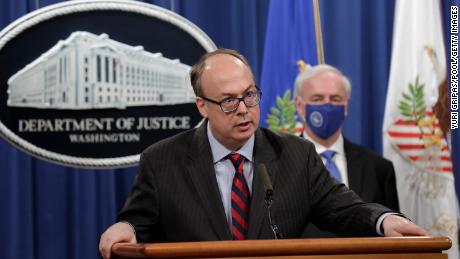A version of this story appeared in CNN's What Matters newsletter. To get it in your inbox, sign up for free here.
Washington (CNN)The January 6 committee is facing a new challenge as multiple people it has subpoenaed signal their intentions to invoke Fifth Amendment protections ahead of their testimony.
Such a move from former Justice Department official Jeffrey Clark and conservative lawyer John Eastman places them in a long line of officials who "took the Fifth" when called to testify before lawmakers.
But what exactly is the Fifth Amendment, and how will it affect the House select committee's probe of January 6? Here's what you need to know:
What does it mean to plead the Fifth?
Invoking the Fifth Amendment is usually done to avoid answering specific questions. Ratified in 1791, the Fifth Amendment protects a person from being "compelled in any criminal case to be a witness against himself."
The amendment reflected an effort to protect witnesses from a kind of inquisitorial Star Chamber of 15th Century England.
Here's exactly what the Fifth Amendment to the US Constitution says: No person shall be held to answer for a capital, or otherwise infamous crime, unless on a presentment or indictment of a Grand Jury, except in cases arising in the land or naval forces, or in the Militia, when in actual service in time of War or public danger; nor shall any person be subject for the same offense to be twice put in jeopardy of life or limb; nor shall be compelled in any criminal case to be a witness against himself, nor be deprived of life, liberty, or property, without due process of law; nor shall private property be taken for public use, without just compensation.
The "self-incrimination clause" generally means that a witness cannot be forced to make statements that he or she feels might be negative or used against them. The right must be affirmatively waived.
Does pleading the Fifth have a negative connotation?
While taking the Fifth can have negative implications depending on the circumstance, the US Supreme Court has long regarded the right against self-incrimination as a venerable part of the Constitution and tried to ensure that a witness' silence not be equated with guilt.
What does it mean for the January 6 committee?
Fifth Amendment invocations from Clark and Eastman could prove to be a significant headache for the House select committee given their significance as witnesses.
Clark helped then-President Donald Trump devise a plan to oust the then-acting attorney general, place himself atop the department and have the Justice Department intervene in Georgia to set aside its voting results in order to sway the state toward Trump. Eastman, meanwhile, helped craft a questionable legal theory that then-Vice President Mike Pence had the constitutional authority to interrupt the certification of the 2020 presidential election results.
With Clark expected to invoke these protections against self-incrimination, it's unclear how much information the committee will receive or if it will be satisfied with his level of participation.
Committee Chairman Bennie Thompson, a Mississippi Democrat, had earlier told CNN of the scheduled deposition, "I can't anticipate what he'll say."
"I just know his lawyer has represented the fact that his client plans to take" the Fifth Amendment, Thompson said. "If he plans to take it, he'll have to take it each and every time we ask him a question."
If Clark answers the committee's questions in his deposition by pleading the Fifth Amendment, the panel will likely have to stop the process of holding him in criminal contempt. But if Clark continues to stonewall the committee, and invoke the Fifth Amendment in ways the committee deems illegitimate, the panel will likely proceed with a floor vote.
When asked if there is still a very good chance they move to criminal contempt after the rescheduled deposition, Thompson replied, "Uh, yes, absolutely."
Though there's been no criminal contempt motion against Eastman, the House select committee has shown it's willing to pursue such a path with uncooperative witnesses.
Eastman confirmed Friday on Steve Bannon's podcast that he had sent the committee a letter informing of his intentions not to cooperate with his subpoena, citing a wide range of legal arguments, including his right to invoke the Fifth Amendment.
"My legal team put together a letter responding to the subpoena request, explaining all the reasons why I was going to assert my privileges under the Fifth Amendment, not to come testify and not to produce all these documents," Eastman told Bannon, who is also a subpoena target and is being prosecuted for contempt of Congress for his unwillingness to cooperate with the committee.
Eastman is scheduled to appear before the committee on Wednesday.
What about document requests?
The Fifth Amendment won't shield Clark, Eastman or any other witnesses from the House select committee's request for some documents.
Why is that? Because the Supreme Court has held that the Fifth Amendment protects against document disclosures only if the disclosure itself is incriminating.
What has Trump said about pleading the Fifth?
Ironically, the former President has derided the Fifth Amendment as the refuge of mobsters.
"If you're innocent, why are you taking the Fifth Amendment," Trump said as a candidate in 2016, complaining about aides to his Democratic opponent, Hillary Clinton, who faced inquires over the use of a private email service when she was secretary of state.
"The mob takes the Fifth," Trump declared.



















